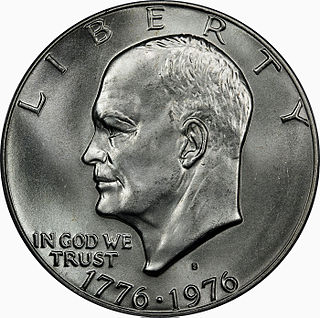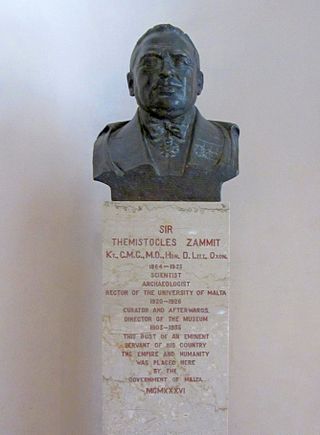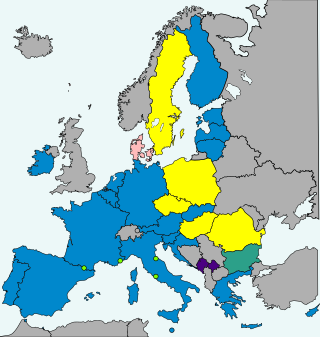Related Research Articles

The lira or pound was the currency of Malta from 1972 until 31 December 2007. One lira was divided into 100 cents, each of 10 mils. After 1986 the lira was abbreviated as Lm, although the original £M sign continued to be used unofficially. In English the currency was still frequently called the pound even after its official English language name was changed to lira.

The United States Bicentennial coinage is a set of circulating commemorative coins, consisting of a quarter, half dollar and dollar struck by the United States Mint in 1975 and 1976. Regardless of when struck, each coin bears the double date 1776–1976 on the normal obverses for the Washington quarter, Kennedy half dollar and Eisenhower dollar. No coins dated 1975 of any of the three denominations were minted.

Philippine peso coins are issued by the Bangko Sentral ng Pilipinas for circulation in the Philippines and are currently available in seven denominations. The Philippine peso has been in use since Spanish rule.

The coat of arms of Malta is the national coat of arms of the country of Malta.

Manwel Dimech, also known as Manuel Dimech was a Maltese socialist, philosopher, journalist, writer, poet and social revolutionary. Born in Valletta and brought up in extreme poverty and illiteracy, Dimech spent significant portions of his early life in the Maltese prison system, mostly on charges of petty theft. At the age of seventeen, Dimech was arrested for the crime of involuntary murder, and sentenced to seventeen years in jail. After being thrown in jail, Dimech started to educate himself and became a man of letters.

The Central Bank of Malta is the Maltese member of the Eurosystem and has been the monetary authority for Malta from 1968 to 2007, issuing the Maltese lira. Since 2014, it has also been Malta's national competent authority within European Banking Supervision.

Christopher Ironside OBE, FRBS was an English painter and coin designer, particularly known for the reverse sides of the new British coins issued on decimalisation in 1971.
L-Għanja tal-Poplu is a popular Maltese song competition first organized by Youth Travel Circle (YTC) on 5 May 1973 at the St. Albert College in Valletta. The founder of YTC is Rev. Maurice Mifsud. Initially the contest had to register as YTC members. From 1987 onward, the contest took a national dimension. The competing songs are sung primarily in Maltese and are written either by the singers themselves or other songwriters. In the 1990s the contest started being transmitted on local television stations. This contest is today organised by the voluntary organisation L-Għanja tal-Poplu and is slso supported by Arts Council Malta.
Charles Camilleri was a Maltese composer.

Ninu "Anthony" Cremona, colloquially known as Is-Sur Nin, was a Maltese writer and health inspector.

Sir Themistocles "Temi" Zammit was a Maltese archaeologist and historian, professor of chemistry, medical doctor, researcher and writer. He served as Rector (1920–26) of the Royal University of Malta and first Director of the National Museum of Archaeology in his native city, Valletta.
Alex Shagin is a coin designer.

Gold and silver issues of the euro commemorative coins are collectors' euro coins not primarily intended for general circulation; the commemoratives also include rare cases of bimetal collector coins, such as titanium and niobium.

Euro gold and silver commemorative coins are special euro coins minted and issued by member states of the Eurozone, mainly in gold and silver, although other metals are also used on rare occasions. Malta introduced the euro (€) on 1 January 2008. In a short time, the Central Bank of Malta has been producing both normal issues of Maltese euro coins, which are intended for circulation, and commemorative euro coins in gold and silver.

Fawwara Gate, also known as Gzira Gate, Sliema Gate, Testaferrata Gate and Tower Gate, is a late 18th-century archway built during the rule of the Order of St. John in Gżira, Malta. The archway was built as a commemoration of a new principal main road that is set on a long stretch of lands from Msida to Sliema; today being two roads namely Msida Road and Rue d'Argens.

Mdina Gate, also known as the Main Gate or the Vilhena Gate, is the main gate into the fortified city of Mdina, Malta. It was built in the Baroque style in 1724 to designs of Charles François de Mondion, during the magistracy of Grand Master António Manoel de Vilhena.

Although the vast majority of coins are round, coins are made in a variety of other shapes, including squares, diamonds, hexagons, heptagons, octagons, decagons, and dodecagons. They have also been struck with scalloped (wavy) edges, and with holes in the middle. Coins in the shape of polygons often have rounded edges or are Reuleaux polygons.

Ædes Danielis, sometimes known as Palazzo Gregorio Bonici, is a late 17th century renaissance building with a private garden in Żejtun, Malta. It is a historic private property built by Gregorio Bonici as his secondary residence, and is now owned by the descendants of the Bonici and Testaferrata families.
References
- ↑ Commemorative Coins Issued from 1972 Archived 2008-05-17 at the Wayback Machine
- ↑ "Euro Coins Collection Malta". Archived from the original on 2011-07-11. Retrieved 2019-11-13.
- ↑ Malta: Silver 10 euro coins.